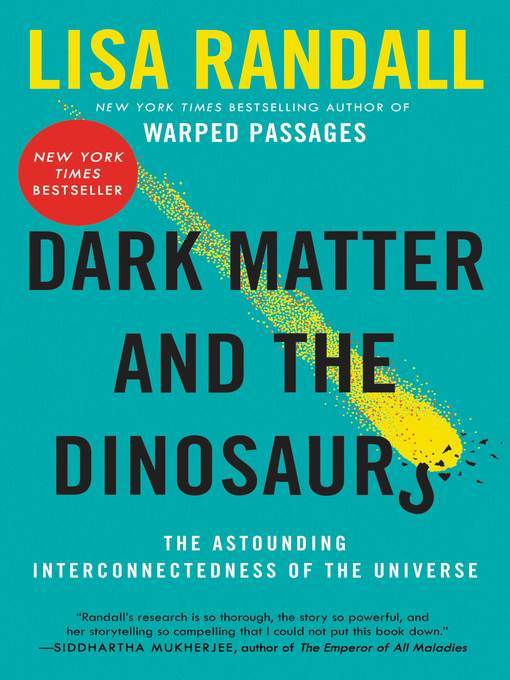
Dark Matter and the Dinosaurs
The Astounding Interconnectedness of the Universe
کتاب های مرتبط
- اطلاعات
- نقد و بررسی
- دیدگاه کاربران
نقد و بررسی

Starred review from September 7, 2015
Using accessible writing and vivid examples, Randall (Higgs Discovery), a theoretical particle physicist and cosmologist at Harvard University, examines the indirect role dark matter may have played in the extinction of the dinosaurs, as just one example of the unlikely connections to be found in the universe. She builds her argument methodically, moving from discussions of the big bang and galaxy formation, through prehistoric extinction events, and into the way dark matter interacts with other forces and particles. Scientists detect dark matter indirectly, Randall says. In space, a massive object bends light as it zips past, so that object’s mass can then be determined by measuring the bend. Its gravity can also perturb the motion of other bodies passing through the area. Randall proposes the existence of a dense disk of dark matter inside the galactic disk of the Milky Way. As stars—including our sun—rotate around a galactic center, they and their planets cross the dark disk. On Earth’s pass-through, the dark disk’s gravity could have perturbed an icy rock in the Oort Cloud, sending it on a collision course with Earth. Randall covers a lot of ground, but does so smoothly even when addressing some of science’s most abstruse subjects. Hers is a fascinating, tantalizing theory, linking life on Earth—or the extinction thereof—with the very origins of our universe.

May 1, 2015
Dark matter: it's hard enough to understand as it is, and now Randall draws on original research to suggest a new kind. But as author of the recent New York Times best-selling Knocking on Heaven's Door, Harvard physicist Randall can talk to the less scientifically proficient. Here she theorizes that the huge comet that purportedly knocked out the dinosaurs and perhaps three-quarters of Earth's other species 66 million years ago was shaken from its orbit as the solar system passed through a disc of dark matter embedded in the Milky Way. With a 100,000-copy first printing.
Copyright 2015 Library Journal, LLC Used with permission.

Starred review from September 15, 2015
To explain the disappearance of the largest land animals the earth has ever seen, Randall probes something that has never been seen: dark matter. More specifically, this acclaimed physicist argues that it was dark matter that nudged a comet earthward, so wiping out the dinosaurs 66 million years ago. As Randall unfolds the reasoning behind this bold speculation, she traverses an impressive range of science. Readers learn of the decisive role that dark matterundetectable except for its gravitational pullplayed in shaping galaxy clusters. They also learn about the dynamics of our own solar system, where our planet's remarkable powers to sustain life may grow or diminish through the impact of objects from space. Widely publicized evidence that such an impact exterminated the dinosaurs gains astonishing new significance as Randall reinterprets it within her theory of how a disk of unusually interactive dark matter, insinuated in the heart of the Milky Way, unleashes a shower of meteoroids every 32 million years. Engrossing in its own right, this theory opens onto an illuminating survey of the cutting-edge science now deployed to test its components, including its daring redefinition of dark matter. As she did in Warped Passages (2005) and Knocking on Heaven's Door (2011), Randall delivers intellectual exhilaration.(Reprinted with permission of Booklist, copyright 2015, American Library Association.)

























دیدگاه کاربران